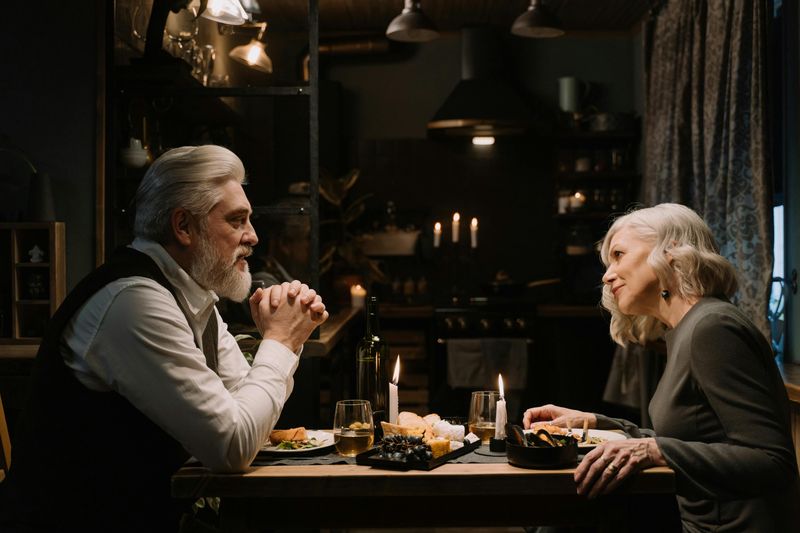10 Things You Should Never Bring Up on a First Date Conversation

First dates are already nerve-wracking enough without accidentally stepping into conversational quicksand. You’re trying to make a good impression while figuring out if there’s a spark worth pursuing. What you choose to talk about can make or break that crucial first meeting, turning a promising connection into an awkward disaster in seconds flat.
1. Harsh Judgments About Their Choices

Criticizing your date’s outfit, food order, or mannerisms creates instant tension. Those snap judgments might seem harmless to you, but they signal a critical personality that few find attractive.
Remember when your date excitedly mentions loving a movie you thought was terrible? This isn’t your chance to prove your superior taste. Instead, ask what they enjoyed about it.
First dates should feel like safe spaces where both people can be themselves without fear of evaluation. Save the constructive criticism for much later – if the relationship even gets that far.
2. Excessive Flattery and Future Plans

Showering your date with non-stop compliments might seem sweet, but it often comes across as insincere or desperate. Similarly, mapping out your future together (“our kids would be so cute!”) sends serious red flags.
A genuine compliment or two? Absolutely welcome. But when you’re already naming your future pets before the appetizers arrive, you’ve crossed into uncomfortable territory.
Keep the conversation grounded in the present moment. Focus on getting to know each other naturally rather than forcing an instant connection or planning a life together before you’ve even learned their middle name.
3. Ex-Partner Horror Stories

Your ex might be the villain in your personal story, but sharing those tales on a first date makes you look like the one with issues. Venting about past relationship disasters signals you’re still processing that baggage.
Even seemingly innocent comments like “my ex never appreciated good restaurants like this” plant seeds of comparison. Your date doesn’t want to feel like they’re auditioning for a role someone else failed at.
When the topic of past relationships inevitably arises, keep it brief and neutral. A simple “We wanted different things” tells them you’ve moved on without dragging your date through your romantic history.
4. Intimate Bedroom Details

Sharing your sexual preferences, experiences, or expectations creates an immediate atmosphere of discomfort. Physical intimacy discussions belong much later, after establishing emotional connection and mutual interest.
Even seemingly innocent comments about past encounters can change the dynamic dramatically. Your date might wonder if you’re only interested in one thing or if you lack appropriate boundaries.
Focus instead on building genuine rapport through shared interests and values. The best relationships develop naturally, with physical aspects evolving alongside emotional connection—not because you fast-tracked the conversation to your favorite positions before finishing your main course.
5. The Non-Stop Personal Monologue

Dominating the conversation with your achievements, stories, and opinions without coming up for air is a guaranteed connection-killer. Your date isn’t an audience for your one-person show—they’re hoping to be an equal participant.
Watch for their engagement signals. Are they trying to speak but can’t get a word in? Have they resorted to just nodding while their eyes glaze over?
Conversation should flow like a tennis match—back and forth with equal participation. Ask open-ended questions about their interests and actually listen to the answers. Your curiosity about them speaks volumes more than any impressive story you might share about yourself.
6. Self-Deprecating Commentary

Constant self-criticism—like saying “sorry about my stupid laugh” or “I’m terrible at telling stories”—creates unnecessary awkwardness. Instead of helping, it puts your date in the position of either repeatedly reassuring you or quietly starting to believe your negative self-assessment.
Everyone has insecurities. However, a first date isn’t therapy, and highlighting your perceived flaws only draws attention to things your date might not have even noticed.
Present yourself with quiet confidence instead. If you make a small mistake, laugh it off briefly without dwelling on it. This shows resilience and self-awareness—far more attractive qualities than seeking constant validation or permission to exist in your own skin.
7. Unresolved Personal Traumas

Sharing deeply painful life experiences creates an emotional intensity most first dates simply can’t support. While authenticity matters, unloading heavy personal struggles before establishing trust puts unfair pressure on your date.
They might feel trapped between uncomfortable sympathy and seeming callous if they try changing the subject. This emotional whiplash often leaves both parties feeling drained rather than connected.
Save vulnerable disclosures for when you’ve built a foundation of mutual care and understanding. Early dates should focus on discovering compatibility through lighter exchanges that reveal your personality, values, and interests without the weight of your most difficult life chapters.
8. Financial Situations and Money Stress

Mentioning your crushing student loans or boasting about your investment portfolio both send problematic signals. Money talk on first dates creates immediate tension, whether you’re struggling or flourishing.
Complaining about prices on the menu, discussing salary details, or explaining your debt consolidation plan shifts the focus from connection to economics. Your date might wonder if you’re evaluating them as a financial prospect rather than a potential partner.
Keep money matters private until you’ve established a meaningful relationship. Pay attention to how they handle the bill situation without explicit discussion—their actions around money will tell you more than any conversation could at this early stage.
9. Controversial Political and Religious Views

Launching into your passionate political stance or religious beliefs transforms a promising date into a potential debate stage. While these topics reveal important values, they require nuance and established rapport to navigate productively.
Strong opinions expressed too early create unnecessary division before you’ve discovered other areas of compatibility. Your date might feel pressured to either agree or defend opposing viewpoints when they’d rather be enjoying lighter conversation.
Instead, focus on finding common ground through less divisive interests. If these subjects naturally arise, acknowledge their importance but suggest exploring them more deeply once you know each other better. This shows both conviction and social intelligence—an attractive combination.
10. Marriage and Baby Timeline Questions

Asking about their ideal wedding or how many children they want while still on your first glass of wine creates instant pressure. These life-altering topics require established emotional connection, not first-date small talk.
Even casual mentions like “I’ve always dreamed of a winter wedding” or “I need to have kids before I’m 35” can send your date mentally calculating their escape route. They haven’t decided if they want a second date yet, let alone a lifetime commitment.
Focus instead on discovering who they are as a person, not as a potential co-parent. The best relationships develop naturally, with major life goals discussed after establishing compatibility on more fundamental levels of personality, values, and mutual enjoyment.

Comments
Loading…